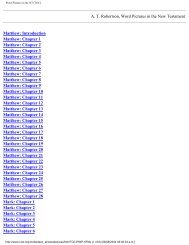Commentary on Joshua - Keil & Delitzsch - David Cox
Commentary on Joshua - Keil & Delitzsch - David Cox
Commentary on Joshua - Keil & Delitzsch - David Cox
You also want an ePaper? Increase the reach of your titles
YUMPU automatically turns print PDFs into web optimized ePapers that Google loves.
<strong>Keil</strong> and <strong>Delitzsch</strong> <str<strong>on</strong>g>Commentary</str<strong>on</strong>g> <strong>on</strong> the Old Testament<br />
glorious sight" ( Ritter , Erdk. xvi. pp. 567-8).<br />
Verse 15. <strong>Joshua</strong> therefore sent them back with their petiti<strong>on</strong>, and said, "If thou art a<br />
str<strong>on</strong>g people, go up into the wood and cut it away," i.e., make room for houses,<br />
fields, and meadows, by clearing the forests, "in the land of the Perizzites and<br />
Rephaim, if the mountain of Ephraim is too narrow for thee." The name "mountain of<br />
Ephraim" is used here in a certain sense proleptically, to signify the mountain which<br />
received its name from the tribe of Ephraim, to which it had <strong>on</strong>ly just been allotted.<br />
This mountain, which is also called the mountain of Israel (Josh 11:16,21), was a<br />
limest<strong>on</strong>e range running from Kirjath-jearim, where the mountains of Judah terminate<br />
(see at Josh 11:21), to the plain of Jezreel, and therefore embracing the greater part of<br />
the tribe-territory of Benjamin. The wood, which is distinguished from the mountain<br />
of Ephraim, and is also described in v. 18 as a mountainous land, is either the<br />
mountainous regi<strong>on</strong> extending to the north of Yasir as far as the mountains at Gilboa,<br />
and lying to the west of Beisan, a regi<strong>on</strong> which has not yet been thoroughly explored,<br />
or else, as Knobel supposes, "the broad range of woody heights or low woody hills,<br />
by which the mountains of Samaria are c<strong>on</strong>nected with Carmel <strong>on</strong> the north-west (<br />
Rob. iii. p. 189), between Taanath and Megiddo <strong>on</strong> the east, and Caesarea and Dor <strong>on</strong><br />
the west." Possibly both may be intended, as the children of Joseph were afraid of the<br />
Canaanites in Beisan and in the plain of Jezreel (v. 16). The Rephaim were dwelling<br />
there, a tribe of gigantic stature (see at Gen 14:5), also the Perizzites (see at Gen<br />
13:7).<br />
Verse 16. The children of Joseph replied that the mountain (allotted to them) would<br />
not be enough for them ( maatsaa' (OT:4672), as in Num 11:22; Zech 10:10); and<br />
that all the Canaanites who dwelt in the land of the plain had ir<strong>on</strong> chariots, both those<br />
in Beth-shean and its daughter towns, and those in the valley of Jezreel. 'eretshaa`eemeq<br />
, the land of the plain or valley land, includes both the valley of the<br />
Jordan near Beisan, and also the plain of Jezreel, which opens into the Jordan valley<br />
in the neighbourhood of Beisan ( Rob. iii. p. 173). The plain of Jezreel , so called<br />
after the town of that name, is called the "great field of Esdrelom" in Judith 1:4, and<br />
to' me'ga pedi'<strong>on</strong> by Josephus. It is the present Merj (i.e., pasture-land) Ibn Aamer ,<br />
which runs in a south-westerly<br />
http://207.44.232.113/~bible/comment/ot/k&d/josh/jos109.html (2 of 3) [13/08/2004 01:18:55 p.m.]
















